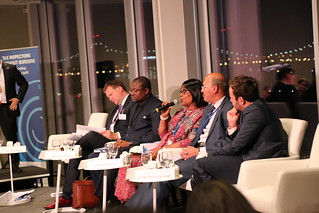Tax Inspectors Without Borders: Four Years and Half A Billion Dollars Later…
United Nations General Assembly Ministerial Panel
24 September 2019
United Nations Headquarters
New York, NY, United States
On the eve of the United Nations Secretary General's High-level dialogue on Financing for Development, Ángel Gurría, Secretary-General of the Organisation for Economic Co-operation and development, and Achim Steiner, Administrator of the United Nations Development Programme, hosted this high-level ministerial discussion looking back on and celebrating the achievements of Tax Inspectors Without Borders (TIWB).
Domestic resources are vital for the achievement of the 2030 Agenda, yet today many developing countries struggle to increase tax to GDP ratios. The highly complex and aggressive tax planning strategies adopted by multinational enterprises lie at the source of major revenue leakages for some countries. The joint OECD-UNDP TIWB initiative is an innovative model filling a gap in addressing Base Erosion and Profit Shifting (BEPS) and abusive tax avoidance by multinational enterprises. TIWB aims to tackle this challenge by deploying tax audit expertise to developing countries on demand.
Launched in Addis Ababa in 2015, TIWB has already delivered USD 500 million in additional revenue for developing countries. On average, for every USD 1 invested in TIWB operations, over USD 100 in tax revenue is mobilised. To date, the initiative has 98 current, completed and upcoming programmes spanning 55 countries and jurisdictions worldwide.
This high-level panel provided the opportunity to engage with government ministers and senior officials on the strengths and opportunities of the TIWB approach, and to share lessons on effective capacity development for domestic resource mobilisation.
The TIWB 2018/19 Annual Report was launched at the event.
This TIWB ministerial panel took place in the margins of the United Nations' General Assembly on 24 September 2019 from 18:15-20:30 EST at United Nations Headquarters, New York, United States.
*Base erosion and profit shifting, or "BEPS", refers to tax planning strategies that exploit gaps and mismatches in tax rules to artificially shift profits to low or no-tax locations where there is little or no economic activity.
SPEAKERS
A panel of ministers discussed the topics.
Welcome and Introduction
- Mr. Angel Gurría - Secretary-General, OECD
- Mr. Achim Steiner - Administrator, UNDP
Moderated Panel Discussion with Ministers
- H.E. Mr. Ville Skinnari - Minister for Development Cooperation and Foreign Trade, Ministry for Foreign Affairs, Finland
- H.E. Mr. Augustus Flomo - Deputy Minister of Finance and Development Planning, Liberia
- H.E. Ms. Kitty van der Heijden - Vice-minister for Foreign Trade and Development Cooperation, The Netherlands
- H.E. Mr. Gilberto Barros - Deputy Minister of Finance, Cabo Verde
- Mr. Arvinn Gadgil - Policy Director for International Development Policy, Ministry of Foreign Affairs, Norway
- Ms. Gladys Ghartey - Head of United Nations System Unit, Ministry of Finance, Ghana
PRESS
- OECD, UNDP Initiative Captures Additional USD 480 Million in Tax Revenue, IISD SDG Knowledge Hub, 26 September 2019
- De Dakar à Tirana, les Inspecteurs des impôts sans frontières à la rescousse, Le Figaro, 24 September 2019
- Auditores tributarios sin fronteras, El Telégrafo, 7 October 2019
VIDEO HIGHLIGHTS
FURTHER INFORMATION
- Sign up to our e-mail alerts
- Follow us on Twitter @TIWB_News
- Contact us: secretariat@tiwb.org
Related Documents


